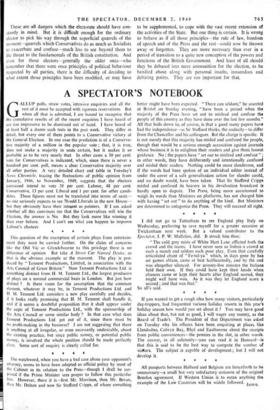The watchword, when you have a bad case abuse your
opponent's attorney, seems to have been adopted as official policy by most of the Cabinet in its relation to the Press—though I shall be sur- prised if the Prime Minister sees proper to follow this particular line. However, there it is—first Mr. Morrison, then Mr. Bevan, then Mr. Dalton and now Sir Stafford Cripps, of whom something better might have been expected. " There can seldom," he asserted at Bristol on Sunday evening, " have been a period when the majority of the Press have set out to mislead and confuse the people of this country as they have done over the last few months." All that boils down to, of course, is that a good many papers have had the independence—as Sir Stafford thinks, the audacity—to differ from the Chancellor and his colleagues. But the charge is specific. It is not merely that this majority has misled and confused the people, though that would be a serious enough accusation against journals whose business it is to enlighten their readers and give them honest guidance. No ; the papers have "set out to mislead and confuse " ; in other words, they have deliberately and intentionally confused and misled their readers. Nothing could be more slanderous, and if the words had been spoken of an individual editor instead of under the cover of a safe generalisation action for slander could, and no doubt would, have been taken. That Sir Stafford Cripps misled and confused its hearers in his devaluation broadcast is hardly open to dispute. The Press, being more accustomed to weigh its words than Ministers on platforms, has not charged him with having " set out " to do anything of the kind. But Ministers are determined to antagonise the Press. They will succeed all right.
* * * *


































 Previous page
Previous page